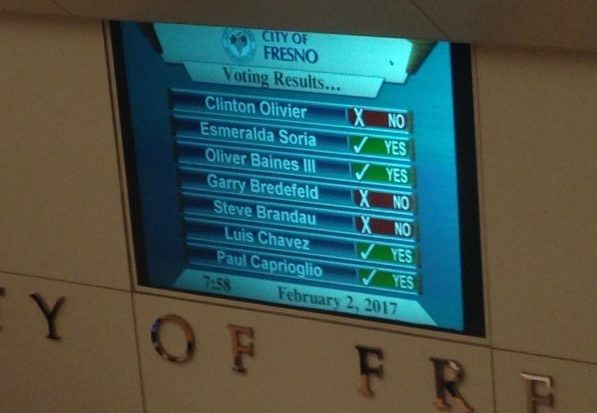
By Daniel O’Connell
In the 1930s, union leader A. Philip Randolph came to Franklin Delano Roosevelt to complain that the New Deal was not helping his workers enough and that stronger measures were necessary to realize progressive reform. FDR listened and then famously said that he had been convinced, “Now go out and make me do it!”
Today, after more than a decade of in-the-trenches, neighborhood-level advocacy, the City of Fresno now has a sound residential rental housing ordinance to protect some of its most vulnerable residents from predatory slumlords who have plagued the community for decades. The ordinance incorporates years of research, community input, Code Enforcement Task Force meetings and best-practice models from cities across the state and country—similar to policies already working elsewhere and long overdue in Fresno. The realization of the policy is a result of Fresno advocates, institutions and residents “making” government respond to their problems.
The Rental Housing Improvement Act provides for a registry of all rental properties. The policy includes a baseline inspection of every non-exempt rental property (exempt properties include those newer than 10 years old or already regulated by another entity such as the Housing Authority). These inspections will give the city real data to accurately identify and focus enforcement efforts on the true “worst of the worst” slumlords. Public resources can then be more conservatively administered while limiting burdensome paperwork on responsible property owners. A tiered system prioritizes problem properties. Non-problem properties will be in Tier 1, which allows for landlords to self-certify housing conditions, with random verification inspections. Properties with problems will either be in Tiers 2 or 3, with varying frequency of follow-up, compliance inspections, and fines, fees or penalties. Significant penalties will result from failure to register properties, making false statements on certifications and other violations.
Pressure from years of advocacy—highlighted by recurring tragedies in lives lost to fires and squalor—realized the policy. The final push was led by committed, community-based groups such as Faith in Community, Lowell Community Development Corporation, and Building Healthy Communities. One tactic used to bring the issue forward by advocates was daily social media posts of actual housing units blighting the city’s neighborhoods. The Fresno Bee’s investigative reporting, and specifically its “Living in Misery” exposé illustrated the depth of the crisis and the need for an interior inspection program. The Bee’s reporting brought the crisis of substandard housing conditions to the community at large beyond the city’s urban core and underserved neighborhoods, compelling the Swearengin administration to address the problem. Fresno State’s faculty and students conducted action-oriented research that documented the problems and offered perspectives to better understand the intensity of the crisis, its causes, and potential solutions.
The ordinance’s final adoption wasn’t without its own drama. On Dec. 8, 2016, then-Mayor Swearengin’s version of an ordinance was scheduled to come before the Fresno City Council but was pulled from the agenda so late that a Council chamber filled with steeled advocates and irate residents threatened to erupt in indignation at yet another delay and postponement. In response to that pressure, the Council agreed to hear their feedback for two hours over the council lunch period as unscheduled public communication. Curious industry representatives huddled in the back of the room, becoming aware of the depth of community outrage.
Speaker after speaker implored the Council to vote on and address the long overdue policy. Advocates and residents were concerned that a postponement would result in lobbying to weaken the policy. Lee Brand, who was sitting on the City Council at the time, promised the audience that his new administration would bring back an improved ordinance no later than February 2nd. The table was set for the community to measure the new mayor’s integrity and political skills in building support around a difficult problem.
Holding to his word, Mayor Brand personally brought forward an improved ordinance in February. Moreover, in crafting the policy, he included the positions of a diverse spectrum of interests, from housing advocates to industry leaders. Inevitably, with Brand’s encouragement, the California Apartment Association became a central partner in realizing a balanced policy. Due to their input, a tenant’s affirmative obligation provision in the ordinance acknowledges that landowners are not obligated to pay fees for tenant damage, but do have to make repairs.
Mayor Brand adroitly negotiated between stakeholders received feedback and offered explanations to the compromises he shaped. His rapport and stature, even among City Council members who were not supportive of the policy, still compelled their respect and acknowledgment of the new mayor’s political craftsmanship. The final comprehensive rental housing ordinance had stronger protections for residents, a broader base of support from industry groups and a higher likelihood of being meaningfully implemented based on the credibility of the new administration, and the determination of housing advocates and resident activists to see it become reality.
The achievement of a residential rental housing ordinance in Fresno is a historic milestone for the entire city. It will improve the lives of its residents and ultimately incentivize reinvestment opportunities in some of the city’s most divested neighborhoods. Yet, there is a broader lesson to take from the advocacy process and political leadership that inevitably realized the rental housing ordinance—that in a democracy, when the people advocate for their interests, politicians respond to their constituents’ demands. The result is that policies are passed that achieve public benefits.
Remember that Richard Nixon created the Environmental Protection Agency, passed the Endangered Species Act, implemented affirmative action programs, enforced the desegregation of schools and opened trade with China—and not because those initiatives expressed his base values, but because social movements demanded those policies and programs.
*****
Daniel O’Connell is the chairperson of the Central Valley Partnership. You may reach him at danieljoconnell@hotmail.com.
